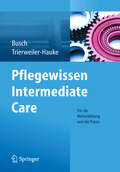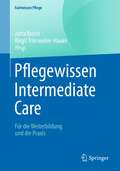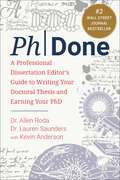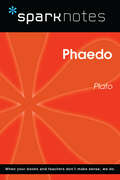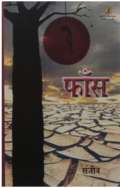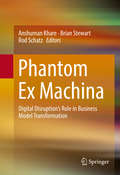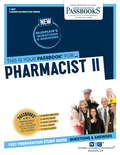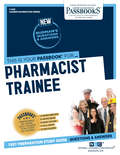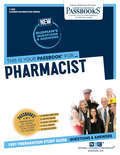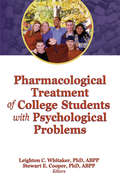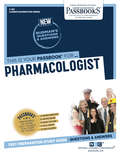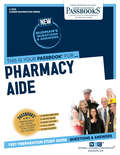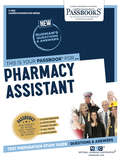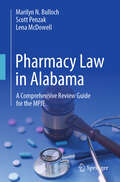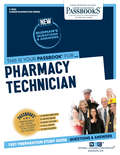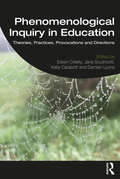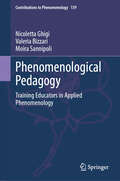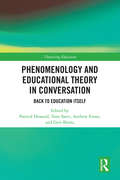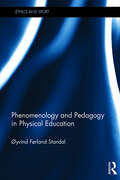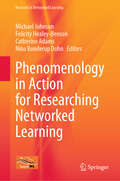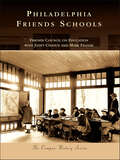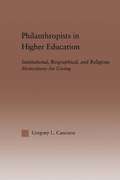- Table View
- List View
Pflegewissen Intermediate Care: Für die Weiterbildung und die Praxis
by Jutta Busch Birgit Trierweiler-HaukeFür das erste Fachbuch zur Pflege auf Intermediate Care-Stationen hat das multiprofessionelle Autoren-Team das Grundwissen zu den intensivpflegerischen Aufgaben lerngerecht aufbereitet: mit Fallbeispielen und Wissensfragen. Der umfangreiche Anleitungsteil bietet Musterformulare für die Vorbereitung, Durchführung und Auswertung von Praxiseinsätzen während der Weiterbildung. Der Band ist als Lehrbuch für die Teilnehmer einer IMC-Qualifizierung bestens geeignet und orientiert sich an den Empfehlungen der Deutschen Gesellschaft für Fachkrankenpflege.
Pflegewissen Intermediate Care: Für die Weiterbildung und die Praxis (Fachwissen Pflege)
by Jutta Busch Birgit Trierweiler-HaukeDas Lehrbuch für die Weiterbildung und darüber hinaus!Dieses Fachbuch bietet Pflegenden aus dem Bereich Intermediate Care (IMC) kompaktes Grundlagenwissen und zeigt dessen erfolgreiche Umsetzung anhand zahlreicher Beispiele aus dem Praxisalltag. Durch die Darstellung konkreter Fälle mit unterschiedlichen Erkrankungen werden die pflegerischen Aufgaben und besonderen Herausforderungen nachvollziehbar dargestellt. Profitieren Sie vom Erfahrungsschatz der Autoren und lesen Sie die zahlreichen Tipps und Anregungen, auch für die gelungene Anleitung neuer Mitarbeiter! Die übersichtliche Struktur ermöglicht Ihnen einen schnellen Zugang zu allen wichtigen Inhalten. Für einen optimalen Einstieg auf die IMC-Station!
PhDone: A Professional Dissertation Editor's Guide to Writing Your Doctoral Thesis and Earning Your PhD
by Kevin Anderson Dr. Allen Roda Dr. Lauren SaundersEverything you need to finally finish your doctorate Based on decades of experience working with thousands of doctoral candidates at Dissertation Editor, Dr. Allen Roda and Dr. Lauren Saunders deliver a comprehensive yet accessible guide filled with practical advice, illuminating stories, and hard-earned wisdom that will empower you to complete your dissertation and earn your degree. Breaking down the doctoral journey step-by-step, offering invaluable tips and resources along the way, PhDone is an essential tool for any doctoral candidate. Dr. Roda and Dr. Saunders demystify what a successful dissertation entails, detailing how to formulate your abstract, write your introduction, research your topic, and build a literature review. In PhDone, you&’ll also learn how to: Choose and construct your methodology (qualitative, quantitative, or mixed methods) Develop research questions, conduct research, and obtain IRB approval Properly analyze results and formulate conclusions Master the process of revising, editing, and formatting Nail your defense and earn final approval In addition to outlining the technical components of a dissertation, PhDone provides recommendations for maintaining a schedule, establishing a productive workspace, and cultivating a work-life balance—integral to a successful PhD journey. Dr. Roda and Dr. Saunders share anecdotes and guidance on the many hurdles doctoral candidates face beyond writing the dissertation itself, including how to navigate dissertation committees, the potentially challenging advisor-advisee relationship, and more. Wherever you are in your doctoral journey, Dr. Roda and Dr. Saunders offer you the tools you need to conquer academia&’s biggest challenge and get PhDone.
Phaedo (SparkNotes Philosophy Guide)
by SparkNotesPhaedo (SparkNotes Philosophy Guide) Making the reading experience fun! SparkNotes Philosophy Guides are one-stop guides to the great works of philosophy–masterpieces that stand at the foundations of Western thought. Inside each Philosophy Guide you&’ll find insightful overviews of great philosophical works of the Western world.
Phans: फांस
by Sanjeevसंजीव 38 वर्षों तक एक रासायनिक प्रयोगशाला, 7 वर्षों तक 'हंस' समेत कई पत्रिकाओं के सम्पादन और स्तम्भ-लेखन से जुड़े संजीव का अनुभव संसार विविधता से भरा हुआ है, साक्षी हंम उनकी प्रायः 150 कहानियाँ और 12 उपन्यास। इसी विविधता और गुणवत्ता ने उन्हें पाठकों का चहेता बनाया है। इनकी कुछ कृतियों पर फिल्में बनी हैं, कई कहानियाँ और उपन्यास विश्वविद्यालयों के पाठ्यक्रमों में हैं। अपने समकालीनों में सर्वाधिक शोध भी उन्हीं की कृतियों पर हुए हैं। 'कथाक्रम', 'पहल', 'अन्तरराष्ट्रीय इन्दु शर्मा', 'सुधा-सम्मान' समेत अनेक पुरस्कारों से सम्मानित... । नवीनतम है हिन्दी साहित्य के सर्वोच्च सम्मानों में से एक इफको का श्रीलाल शुक्ल स्मृति साहित्य सम्मान-2013। अगर कथाकार संजीव की भावभूमि की बात की जाये तो यह उनके अपने शब्दों में ज्यादा तर्कसंगत, सशक्त और प्रभावी होगा-“मेरी रचनाएँ मेरे लिए साधन हैं, साध्य नहीं। साध्य है मानव मुक्ति।”
Phantom Ex Machina
by Anshuman Khare Brian Stewart Rod SchatzThis book explores the factors that make digital disruption possible and the effects this has on existing business models. It takes a look at the industries that are most susceptible to disruption and highlights what executives can do to take advantage of disruption to re-invent their business model. It also examines the pivotal role that technology plays in creating new dynamics to business operations and forcing business model changes. Adoption of digital technology has caused process disruptions in a number of industries and led to new business models (e. g. , #65533;ber, AirBnb) and new products. In addition to covering some of the more popular and well known examples, this book targets not so obvious disruptions in the education sector and in services and changing business models. Phantom Ex Machina: Digital Disruption's Role in Business Model Transformation is divided into six parts. The book begins with an introduction to digital disruption and why it matters. The next part of the book focuses on business strategy which includes case studies on the impact of social media and how digital disruption changes pricing strategies and price models. For part three, the authors observe technology's role in digital disruptions. Chapters cover how 3D printing is challenging existing business models and how the automotive industry is innovating with new perspectives. Part four covers higher education, recognizing digital disruption's transformation in graduate management education. Part five centers upon the service industry with a look at virtual teams and the emergence of virtual think tanks. Finally the book concludes with a look to the future, embracing disruptions.
PharmCards: Review Cards For Medical Students
by Eric JohannsenThe bestselling card-based pharmacology review for medical and allied health students, this 250+ card set readies students for board exams and clinical wards with fast access to essential coverage of both fundamental and organ system-specific information for the most clinically relevant drugs. Topic selection reflects the expert curriculum guidance of the National Board of Medical Examiners and reinforces understanding of major drug classes as well as specific drugs. Now available in print or a convenient new digital format optimized for mobile devices, this fifth edition familiarizes students with the most current drugs prescribed in clinical settings and features an enhanced full-color format to provide students the most efficient and effective pharmacologic review.
Pharmacist II: Passbooks Study Guide (Career Examination Series #C-1837)
by National Learning CorporationThe Pharmacist II Passbook® prepares you for your test by allowing you to take practice exams in the subjects you need to study. It provides hundreds of questions and answers in the areas that will likely be covered on your upcoming exam.
Pharmacist Trainee: Passbooks Study Guide (Career Examination Series #C-649)
by National Learning CorporationThe Pharmacist Trainee Passbook® prepares you for your test by allowing you to take practice exams in the subjects you need to study. It provides hundreds of questions and answers in the areas that will likely be covered on your upcoming exam, including but not limited to: pharmaceutical terminlolgy; record keeping; arithmetic; supervision; and other related areas.
Pharmacist: Passbooks Study Guide (Career Examination Series #C-1837)
by National Learning CorporationThe Pharmacist Passbook® prepares you for your test by allowing you to take practice exams in the subjects you need to study. It provides hundreds of questions and answers in the areas that will likely be covered on your upcoming exam, including but not limited to; Pharmacy work and pharmacology; Manufacture of standard preparations; Procedures for effective control of alcohol and narcotics; Preparation of records and requisitions; and more.
Pharmacological Treatment of College Students with Psychological Problems
by Leighton C. Whitaker Stewart E. CooperGet valuable insights into best practices and procedures for treatment Mental health practitioners across the country are increasingly treating students by combining the use of psychotropic medication with psychotherapy. Pharmacological Treatment of College Students with Psychological Problems explores in detail this uncritically accepted exponential expansion of the practice. Leading psychiatrists, psychologists, and social workers discuss the crucial questions and problems encountered in this widespread practice, and also present specific and differing models of combined therapy. This book critically examines several of the key issues, practices, and competing perspectives. Professionals working in college mental health are provided with valuable insights into best practices and procedures in split and integrated treatment. Various clinicians beyond the psychiatric field are prescribing psychotropic medications with increasing frequency. Pharmacological Treatment of College Students with Psychological Problems presents a wide range of viewpoints on this issue, offering evidence, arguments, and recommendations to clearly illustrate the need for increased attention to the use of psychotropic medications and show how psychotherapy may be safer and more beneficial. Chapters include discussions on withdrawing from medication successfully, long term perturbation effects, and differing models of combined therapy in practice. This resource is comprehensively referenced. Topics in Pharmacological Treatment of College Students with Psychological Problems include: identification of the key issues and practices of combining psychotropic medication with counseling in treatment elements of two separate university counseling centers and how they provide combined treatment emerging research on perturbation effects of use of psychotropic medications best practices in the combined treatment in college settings key unresolved questions that need further research bringing a more sophisticated level in the practice of combined treatment with college students Pharmacological Treatment of College Students with Psychological Problems is a valuable resource for all professionals from seasoned professionals to beginning practicum students.
Pharmacologist: Passbooks Study Guide (Career Examination Series)
by National Learning CorporationThe Pharmacologist Passbook® prepares you for your test by allowing you to take practice exams in the subjects you need to study. It provides hundreds of questions and answers in the areas that will likely be covered on your upcoming exam, including but not limited to: effects of chemicals on the environment and human body; mathematics; understand and interperate written material; report writing; and other related areas.
Pharmacy Aide: Passbooks Study Guide (Career Examination Series #C-2576)
by National Learning CorporationThe Pharmacy Aide Passbook® prepares you for your test by allowing you to take practice exams in the subjects you need to study. It provides hundreds of questions and answers in the areas that will likely be covered on your upcoming exam, including but not limited to: clerical operations with letters and numbers; name and number checking; office record keeping; and other related areas.
Pharmacy Assistant: Passbooks Study Guide (Career Examination Series #C-2943)
by National Learning CorporationThe Pharmacy Assistant Passbook® prepares you for your test by allowing you to take practice exams in the subjects you need to study. It provides hundreds of questions and answers in the areas that will likely be covered on your upcoming exam, including but not limited to: basic pharmaceutical terminlolgy and knowledge; record keeping; arithmetic calculations; and other related areas.
Pharmacy Law in Alabama: A Comprehensive Review Guide for the MPJE
by Marilyn N. Bulloch Scott Penzak Lena McDowellIn most states, anyone wishing to obtain a license to practice pharmacy must take a state-specific test on pharmacy law called the Multistate Pharmacy Jurisprudence Examination (MPJE). This exam is a combination of Federal pharmacy law and state-specific laws. While some states have their laws, rules, and regulations in an easy to access area, there is no centralized area for all the content on the MPJE exam in Alabama. Furthermore, student pharmacists are typically only taught state-specific laws, rules, and regulations for the state in which their school resides. If a person graduates from a school in a different state, they must compile all the information for the MPJE themselves, which can be cumbersome and time consuming. This book seeks to bridge this gap by including all the information needed to prepare for the MPJE for the state of Alabama, authored by pharmacists who are actively practicing and teaching within the state.
Pharmacy Technician: Passbooks Study Guide (Career Examination Series)
by National Learning CorporationThe Pharmacy Technician Passbook® prepares you for your test by allowing you to take practice exams in the subjects you need to study. It provides hundreds of questions and answers in the areas that will likely be covered on your upcoming exam, including but not limited to: keeping simple inventory records; name and number checking; pharmaceutical terminlolgy, principles and practices; and other related areas.
Phase Theory
by Barbara CitkoPhase Theory is the latest empirical and conceptual innovation in syntactic theory within the Chomskyan generative tradition. Adopting a cross-linguistic perspective, this book provides an introduction to Phase Theory, tracing the development of phases in minimalist syntax. It reviews both empirical and theoretical arguments in favor of phases, and examines the role phases play at the interface with semantics and phonology. Analyzing current phasehood diagnostics, it applies them in a systematic fashion to a broad range of syntactic categories, both phases and non-phases. It concludes with a discussion of some of the more contentious issues in Phase Theory, involving cross-linguistic variation with respect to phasehood and the dynamic versus static nature of phases.
Phenomenological Inquiry in Education: Theories, Practices, Provocations and Directions
by Edwin Creely Jane Southcott Kelly Carabott Damien LyonsPhenomenological Inquiry in Education is an edited collection of 16 chapters that offers a fascinating and diverse range of approaches and views about phenomenological inquiry as applied in educational research. Written by a group of international scholars concerned about understanding lived experience, the editors assemble theoretical ideas, methodological approaches and empirical research to create a distinctive transdisciplinary outlook. Embodying many unique and useful insights the book provokes thought about the possibilities for phenomenology in contemporary educational research. The international contributors highlight what an exploration of lived experience can offer qualitative research and extend on methodologies commonly used in educational research. By grounding phenomenological inquiry in the complexities of doing research across discipline areas in education, the writers of the book forge links between theory and empirical research, and give their unique perspectives about how phenomenological ideas are being and might be employed in educational research. The book is thus carefully crafted to address both phenomenology as a philosophical tradition and its possibilities for educational research. This scholarly work will appeal to educational researchers, as well as those in broader social research. It taps into the growing international interest in phenomenological research in education which brings attention to lived experience and the highly important affective dimension of learning.
Phenomenological Pedagogy: Training Educators in Applied Phenomenology (Contributions to Phenomenology #139)
by Valeria Bizzari Nicoletta Ghigi Moira SannipoliThis volume covers the application of phenomenology not only to psychology and psychiatry but precisely to pedagogy and the training of educators. It fills a gap in offering a unique resource which combines both theory and practice. Through an interdisciplinary means, this book provides new theories and applications of phenomenological pedagogy at all levels of education and with a unique focus on autism and special educational needs. It proposes a shift in the paradigm and treatment: from a neuro-cognitivist approach at the present core of most pedagogical theories to a phenomenological and enactivist perspective on subjectivity. It appeals to students, researchers, and practitioners working in phenomenology, psychology and education.
Phenomenology and Educational Theory in Conversation: Back to Education Itself (Theorizing Education)
by Gert Biesta Patrick Howard Tone Saevi Andrew ForanPhenomenology and Educational Theory in Conversation challenges the abstract-technical understanding of education to orient the reader to the importance of relationality, intersubjectivity, and otherness to renew and reclaim the educational project. This book treats education as a matter of existence, relationality, and common human concerns. It offers readers an alternative language to reveal and challenge the humanistic encounters that often disappear in the shadows of neoliberalism. The phenomenologists, and educational theorists featured here, offer insights that connect fully and concretely with the everyday lives of educators and students. They offer another language by which to understand education that is counter to the objectifying, instrumentalist language prevalent in neoliberal discourse. This book will be of great interest for academics, researchers, and post-graduate students in the fields of pedagogy, phenomenology, educational theory, and progressive education.
Phenomenology and Pedagogy in Physical Education (Ethics and Sport)
by Oyvind StandalPhenomenology is a philosophical approach to the study of consciousness and subjective experience. In recent years it has become a more prominent element of the social scientific study of sport and a core component of the important emergent concept of physical literacy. This book is the first to offer a philosophically-sound investigation of phenomenological perspectives on pedagogy in physical education. <P><P> The book argues that phenomenology offers a particularly interesting theoretical approach to physical education because of the closely embodied relationship between the knowledge object (the actions, activities and practices of movement) and the knowing subject (the pupil). Drawing on the work of key phenomenological thinkers but also exploring the implications of this work for teaching practice, the book helps to illuminate our understanding of important concepts in physical education such as practical knowledge, skill acquisition, experience and ethics. <P><P> This is fascinating reading for any serious student or researcher working in physical education or the philosophy or sociology of sport.
Phenomenology in Action for Researching Networked Learning (Research in Networked Learning)
by Michael Johnson Catherine Adams Nina Bonderup Dohn Felicity Healey-BensonThis book champions phenomenology’s place in networked learning theory, research, and practice. The book illuminates and showcases something of the powerful richness, depth, and novel insights offered by phenomenological perspectives on human experience to invoke a fundamental rethinking of experience in networked learning. It also signals the broader learning technology community to acknowledge and engage with these perspectives. The editors and authors have collaborated to bring a renewed focus upon the human facet of networked learning. As our world becomes more digitally enmeshed, infiltrated, and contested, the need to investigate and convey, at maximum fidelity, the lived experience of learners, teachers, and other stakeholders in education becomes paramount. Through phenomenological inquiry, we disclose the complex dance between the human and the technical, spotlighting how individuals engage, navigate, and find meaning within virtual yet embodied landscapes. This approach suitably honours the complexity, profundity, and ethicality of human existence in our evolving digital ecologies. The first section, “Phenomenological Perspectives in Researching Networked Learning” lucidly explains phenomenology and some of its potential affordances. The second section, “Practising Phenomenological Research in Networked Learning”, explicates the tangible practice of phenomenological research into specific phenomena: chapters sample of a select range of studies that also indicate the kind of insights such research can bring to networked learning. The concluding section presents two chapters that denote novel and arresting, “Critical Phenomenological Perspectives on Networked Learning”. Together, these final chapters demonstrate the type of radical challenge that phenomenology can bring to the field, refreshing even networked learning’s most basic conceptions and practices. With this book, we open a space for anyone who wishes to join us in the wonderful, inspiring, and challenging application of phenomenology within the field of networked learning.
Philadelphia Friends Schools: Friends Council on Education (Campus History)
by Friends Council on EducationWilliam Penn envisioned a society dedicated to religious toleration, participatory government, and liberty. Central to this Holy Experiment was his belief that all children deserved a moral education. In 1689, Penn established a Friends Public School in the commonwealth of Pennsylvania. Over the years, many Quakers have been similarly inspired, and today there are 81 member schools in the Friends Council on Education operating in 22 states. This book includes images from the 10 Friends schools founded in or near Philadelphia before the 20th century: Abington Friends School, Frankford Friends School, Friends� Central School, Friends Select School, George School, Germantown Friends School, Greene Street Friends School, Plymouth Meeting Friends School, William Penn Charter School, and Westtown School. Philadelphia Friends Schools tells the photographic story of an educational philosophy rooted in three centuries of faith and practice.
Philanthropists in Higher Education: Institutional, Biographical, and Religious Motivations for Giving (RoutledgeFalmer Studies in Higher Education)
by Gregory CascioneThe main purpose of this book is to explore and understand the motivation behind major donations to higher education and what the role of religion is in these motivations. Features interviews with major donors.
